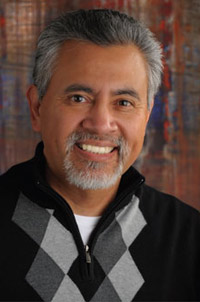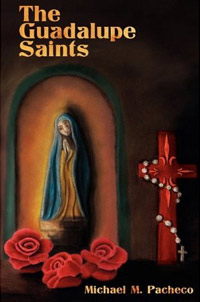This week, TheLatinoAuthor.com is featuring veteran novelist Miguel M. Pacheco. Mr. Pacheco grew up in Washington State, although born in Jalisco. Living on the Yakima Indian Reservation in Washington, he discovered the richness of growing up in a blended environment. He used those experiences to pursue his career in law and then as a writer. Read our interview with Miguel M. Pacheco and see what compelled him to become a writer of short stories and a novelist.


Can you begin by telling us a little bit about yourself; where you grew up, where you currently reside, family upbringing, or anything you would like our readers to know about you?
My given name is Miguel Mauro Pacheco and I am told that my roots run deep in Los Altos de Jalisco. I wouldn’t know too much about that as I was a child of four in the late 50’s moving to the USA. We were good Catholics who didn’t believe in birth control, at least not the sacrilegious type. I ended up in the middle of a family of ten children. I never had my own bed until I started college.
My father chose the Yakima Valley in central Washington State to settle down and raise our family. It was a good choice though I would not realize that fact until many years later. Our home was in the Yakima Indian Reservation. There, I learned that friendships are not dependent upon race or skin color. I became friends with Native Americans, Mexicans, some black kids, Asians, and of course, white kids. It was only upon reflection that I saw I lived within a human rainbow.
The impetus for attending law school (apart from pleasing my parents), was not to make a lot of money or even to provide justice to those who needed or deserved it. It was out of vengeance. I had seen my father cheated out of money in several contracts situations where his white landowner boss had reneged on his promises. Seeing my father humbled and shamed, I vowed to get my license and exact revenge upon that mean man. Of course, I did obtain my license to practice law, but I also got a good dose of common sense along my educational journey. After receiving my BA at Gonzaga, I began law school at Georgetown Law Center in Washington, DC. I later completed my legal training at Willamette University in Salem, OR. Now, more than several decades later, I have retired from the practice of law.
You have a career in the legal profession; however, you went on to publish both short stories and several novels. Did your career provide you the spark to become an author or was this always a passion of yours?
I believe I always had the desire to write, especially fiction. My first work published was a Christmas story that I wrote when I was about 12 years old. It was published in the local newspaper. At that time, I had been speaking and writing English for only six years so it was quite a pleasure to see my work in print. My legal training taught me to be focused in my writing. The disciplined writing of legal articles also forced me to be more selective in my word choices than I had been previously, but to answer the question – no. My legal career did not provide the spark, but rather added fuel to the flame.
Do you prefer writing short stories, novels, or both? Please elaborate.
I prefer writing novels, but I love writing both. Like many other fiction writers, I can dream an entire short story, literally overnight. I put pen to paper at the first opportunity after I have one of these dreams. As for novels, I consider them a stamp of our personality on paper, so I try to refine whatever plot I have started with into an entertaining story arc with subplots and major and minor characters.
I especially enjoy the phenomenon that occurs when the characters seem to take over your story. When I first read about this concept, I thought, “Estan locos.” How can the character that I created tell me what to do? Yet that is precisely the feeling one senses as the actors within the story play out their parts.
What technical challenges do you find when writing short stories or novels? Are the challenges the same or different? Please explain.
When I first began arguing cases to juries (both civil and criminal), I learned to tell them a story. There’s something about a story arc that helps us to understand basic moral and ethical principles so well. I carried that skill over to my writing, especially in fiction. One challenge I find interesting is how to gauge your readership. I’ve entered writing contests where you actually had to “dumb down” your work to be noticed. This is especially true if you’re being judged by a writing community that is barely literate. I hope I don’t sound elitist. I just like to read good prose with proper English and I think people expect the same from me.
I believe that every word in a short story has great significance, more so than in novels. One obvious reason, of course, is the limitation on the word count, but the significance extends to their import of meaning. With just the right word or sentence, a good piece of writing can become a great and memorable one.
What have been some of the challenges you’ve faced when marketing or publishing your written work?
I received an email from Luis Alberto Urrea recently describing the marketing and promotion part of our written work as a “hard hustle.” He’s right. It is a hustle, of sorts. Each of us writers has to find a way to differentiate ourselves from the masses and that’s not an easy task. The actual act of publishing is easier these days due to modern technology and print-on-demand publishing houses but the marketing and promoting of the work remains a hard hustle.
My first published novel, The Guadalupe Saints, was picked up by Paraguas Books. They are incorporated in England but they operate out of Florida with one of their editors living in Panama. It is a small operation but they never promise anything they cannot deliver. To promote that book and my novella, Seeking Tierra Santa, I have friends and family who have assisted me in planning book signings and readings. The entire experience has been well worth the effort.
What avenues for marketing or publishing your works have worked best for you?
For marketing, there’s nothing that can replace persistence and good old door-knocking, figuratively speaking. For example, I was told that I would never get a book review by the Portland Oregonian because they only picked up reviews from the wire-fed sources. I think that’s true, generally speaking. Still, I emailed the chief entertainment editor and requested the name and address of the book review editor. I sent a copy of the book to them and lo and behold, my book was reviewed.
What advice do you have for aspiring writers?
Keep writing. I know that sounds trite, but it’s the best advice out there. By continuously writing, you are continuously practicing. It’s a bit like saying you’re practicing law. You’ll never be perfect but you keep honing your skills. Learn to expect some rejections. Everybody starts somewhere. Hay que tener ganas.
If you could have dinner with anyone in the world (dead or alive), who would it be and why?
I love food, so I won’t pick someone who looks really skinny like some old sage, ha ha. I suppose the name of the person I’d like to have dinner with is unknown. That’s because I’d love to dine with the Director of Construction (my title) of the Great Pyramids of Egypt. The questions I’d have for him/her are probably obvious. Why did you build these mammoth structures? How did you do it? The food, I’m sure would be scrumptious.
Do you find that being Latino has helped or hindered your career in the writing business?
Funny how that works. I was Mexican when I came here. Then as I listened to Woodstock, someone told me I was Chicano. After that, and for a long time, I became Mexican-American. Today, I guess I’m Latino. LOL.
No question about it. My Hispanic heritage has helped my career tremendously. By the grace of God, I was born into a family with culturally-rich traditions, from quinceaneras, to jarabe tapatio, to el grito, to las mananitas, and more. When I began writing I naturally gravitated toward Hispanic themed stories. At first, I was a little gun-shy. Now, it’s just second nature.
Can you tell us about any upcoming projects in the near future?
My novel titled Miracle at Golgotha should be finished this year. It is a story about the son of “the good thief” who was crucified next to Christ. The story follows a young gentile who first becomes a Jew then finds Christianity.
As for short stories, I write those all the time, at work, at home, at the airport, on vacation, etc.
I’ve been invited and likely will participate (depending on my schedule then) at a reading at Willamette University in March 2012.
Visit me at: www.michaelmpacheco.com




